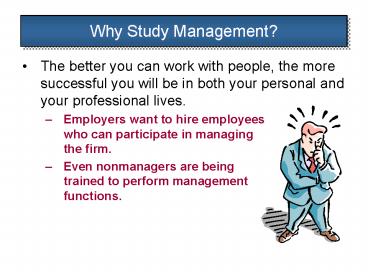Why Study Management
1 / 18
Title: Why Study Management
1
Why Study Management?
- The better you can work with people, the more
successful you will be in both your personal and
your professional lives. - Employers want to hire employees who can
participate in managing the firm. - Even nonmanagers are being trained to perform
management functions.
2
Why Study Management? (contd)
- The study of management builds the skills needed
in todays workplace to succeed in - Becoming a partner in managing your organization
through participative management. - Working in a team and sharing in decision making
and other management tasks. - The study of management also applies directly to
your personal life in helping you to - Communicate with and interact with people every
day. - Make personal plans and decisions, set goals,
prioritize what you will do, and get others to do
things for you.
3
What Is a Managers Responsibility?
- Manager
- The individual responsible for achieving
organizational objectives through efficient and
effective utilization of resources. - The Managers Resources
- Human, financial, physical, and informational
- Performance
- Means of evaluating how effectively and
efficiently managers use resources to achieve
objectives.
4
What Does It Take to Be a Successful Manager?
- Management Qualities
- Integrity, industriousness, and the ability to
get along with people - Management Skills
- Technical
- Human and communication
- Conceptual and decision-making skills
- The Ghiselli Study
- Initiative, self-assurance,decisiveness,
intelligence, need for occupational achievement,
and supervisory ability
5
What Do Managers Do?
- Management Functions
- Planning
- Setting objectives and determining in advance
exactly how the objectives will be met. - Organizing
- Delegating and coordinating tasks
and allocating resources to achieve
objectives. - Leading
- Influencing employees to work toward achieving
objectives. - Controlling
- Establishing and implementing mechanisms to
ensure that objectives are achieved.
6
The Systems Relationship among the Management
Functions
7
Management Roles
- Role
- A set of expectations of how one will behave in a
given situation. - Management Role Categories (Mintzberg)
- Interpersonal
- Figurehead, leader, and liaison
- Informational
- Monitor, disseminator, and spokesperson
- Decisional
- Entrepreneur, disturbance handler, resource
allocator, and negotiator
8
Ten Roles Managers Play
Managers play various roles as necessary while
performing their management functions so as to
achieve organizational objectives.
Exhibit 14
9
Differences Among Managers
- The Three Levels of Management
- Top managers
- CEO, president, or vice president
- Middle managers
- Sales manager, branch manager, or department head
- First-line managers
- Crew leader, supervisor, head nurse, or office
manager - Nonmanagement operative employees
- Workers in the organization who are supervised by
first-line managers.
10
Management Levels and Functional Areas
Exhibit 15
11
Types of Managers
- General Managers
- Supervise the activities of several departments.
- Functional Managers
- Supervise the activities of related tasks.
- Common functional areas
- Marketing
- Operations/production
- Finance/accounting
- Human resources/personnel management
- Project Managers
- Coordinate employees across several functional
departments to accomplish a specific task.
12
New Workplace Issues and Challenges
13
New Workplace Issues and Challenges (contd)
- Technology and Speed
- E-business work done by using electronic
linkages (including the Internet) between
employees, partners, suppliers, and customers. - E-commerce business exchanges or transactions
that occur electronically. - Globalization and Diversity
- Mergers are creating larger globalized firms.
- Firms competing globally have to act locally.
- Diversity is increasing as minorities grow and
markets globalize.
14
E-Commerce
Exhibit 18
15
New Workplace Issues and Challenges (contd)
- Knowledge, Learning, Quality, and Continuous
Improvement - Information is the foundation of knowledge which,
in turn, is the foundation of competitive
advantage. - Knowledge workers
- The learning organization
- Knowledge Management
- Involves everyone in an organization in sharing
knowledge and applying it to continuously improve
products and processes.
16
New Workplace Issues and Challenges (contd)
- Change, Creativity, Innovation, and
Entrepreneurship - Knowledge management requires that people change
in order to continually improve. - The speed of change in modern business has
increased because of globalization and changes in
technology. - Creativity is coming up with new ideas for
improvements, and innovation is implementing
those ideas. - Entrepreneurship is about generating creative
ideas and using them through innovation.
17
New Workplace Issues and Challenges (contd)
- Participative Management, Empowerment, and Teams
- Empowering employees to share in performing
management functions by working in teams. - Learning organizations manage knowledge well by
empowering teams to be creative and innovative. - Ethics and Social Responsibility
- Managerial integrity
- Situational responses
18
New Workplace Issues and Challenges (contd)
- Networking and Boundaryless Relationships
- Electronic networks
- Relationship networks
- Virtual integration

